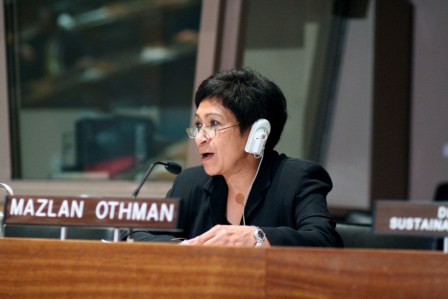|
from Exopolitics Website
Dr Mazlan Othman
Director or the UN
Office of Outer Space Affairs
The United Nations is set to appoint the head of its Office of Outer Space Affairs (UNOOSA) as the first official responsible for representing humanity in the case of contact with extraterrestrial life.
At an upcoming Royal Society (of London) conference scheduled from October 4-5, Dr Mazlan Othman will explain how the UN plans to implement changes that will result in her being given responsibility as part of her current position as the director of UNOOSA. Othman says the need for such a responsibility is due to the discovery of exoplanets that makes it more likely than ever that humanity will eventually discover extraterrestrial life.
She has said that the UN is now actively
planning a coordinated response for ‘First Contact’ .
She was nominated by Kofi Annan to head UNOOSA from 1999 to 2002, before being summoned back to Malaysia to head the Malaysian National Space Agency from 2002-2007. She was responsible for the training and flight of Malaysia’s first astronaut Sheikh Muszaphar Shukor, and was re-appointed head of UNOOSA by the current UN Secretary General Ban Ki-moon, in 2007.
As far as Othman’s scientific expertise is concerned, Professor Richard Crowther, a space law expert at the United Kingdom’s space agency said:
In a recent talk Othman said:
At the October 4-5 Royal Society conference, Othman will go into detail in the process the UN plans to undertake to appoint her as humanity’s first representative for First Contact.
The Conference is titled “Towards a scientific and societal agenda on extra-terrestrial life,” and its webpage explains the need for political processes to accommodate scientific study of extraterrestrial life:
Othman will present at a panel discussion titled: “Extra-terrestrial life and arising political issues for the UN agenda."
Recently, renowned astrophysicist, Stephen Hawking caused a furor when he said that extraterrestrial life is almost certain to exist, but we should be careful since they are likely to be predatory in nature.
Hawking’s exopolitical speculations has
stimulated wide ranging debate over the motivations of
advanced extraterrestrial life. As
a member of the Royal Society, Hawking's views very likely played a
role in influencing the agenda of the upcoming Royal Society
conference.
For example, the proposed Ordinance asks:
It will certainly be difficult to
dismiss the importance of Denver’s proposed Extraterrestrial
Affairs Commission if the UN moves forward with its plans to
appoint Othman as the official responsible for First Contact, and
the Royal Society endorses political processes to deal with the
detection of extraterrestrial life.
Such a political discussion - popularly known as exopolitics - is the explicit focus of the upcoming Royal Society Conference.
Uthman’s upcoming responsibility makes it more important than ever that the academic/scientific community discusses the social and political implications of the discovery of extraterrestrial life, and the growing likelihood of First Contact.
Extraterrestrial
First Contact from Exopolitics Website
Kavli Royal Society International Centre. Venue of Oct 4-5 conference: "Towards a scientific and societal agenda on extra-terrestrial life."
Photo: Royal Society
On Sept 26, I reported on a breaking story that at an upcoming Royal Society conference, the head of the United Nations Office of Outer Space Affairs (UNOOSA), Dr Mazlan Othman, was to reveal how the UN was preparing to appoint her to be the First Contact liaison with extraterrestrial life.
The story was first reported by Jonathan Leake, the Science Editor for The Sunday Times, and was picked up my multiple international mainstream media sources including the Sunday Telegraph and The Australian.
The Guardian newspaper was eventually able to get in touch by email with Othman to confirm Leake's story and she replied:
In addition to Othman's email, when business opened on Monday, Fox News was able to get in touch with Jamshid Gaziyev, a UN spokesperson who described the story as "nonsense."
The question that remains to be
answered is why did the Science Editor of a major British newspaper
write about the UN appointing a First Contact liaison with
extraterrestrials if there was no substance to it?
The conference Leake is referring to is titled: "Towards a scientific and societal agenda on extra-terrestrial life" scheduled to take place on October 4-5.
The conference webpage says:
This is what Leake went on to say about what Othman was set to announce at the conference:
What was the basis for Leake's comments about Othman's upcoming talk?
This is what he wrote:
From the recorded talk, it's safe to conclude that Othman believes that the UN ought to "have in place a coordinated response" to the discovery of extraterrestrial life.
Leake goes on to write:
So what proposals is Leake referring to here?
He doesn't explain what these are and how he learned of them, but he nevertheless elaborates on what the UN is planning.
In contrast, according to Gaziyev, the UN spokesperson, Othman's forthcoming conference presentation would:
That's surprising given the theme of the conference and the panel Othman was set to appear on:
It is sensible given the alleged recorded talk by Othman that Leake said the Sunday Times has and he cited, that Othman is at the very least interested in the UN having "in place a coordinated response" to the discovery of extraterrestrial life.
Is the UN
playing damage control on what Othman was likely to discuss at a
Royal Society conference addressing exopolitical issues confronting
the UN with the inevitable discovery of extraterrestrial life?
So the question is why did Leake publish a story that both Mazlan Othman and the UN would quickly repudiate? Why did he write about Othman's,
Did he infer, fabricate or was he tipped off concerning these "proposals" and "plans"? Was he acting alone or was he acting on behalf of others in preempting or sabotaging what Othman was planning to say at the upcoming Royal Society conference?
There is a
lot of mystery behind Leake's initial report given his very
responsible position as the Science Editor for a major UK newspaper.
Perhaps she'll focus on space rocks hitting the Earth as the UN spokesperson said. Or perhaps she'll open up and discuss the UN having "in place a coordinated response" to the discovery of extraterrestrial life as Leake suggested.
We'll find out shortly.
While the conference is now
filled, I've been informed by organizers that sessions will be
digitally recorded for audio and video release through the
Royal
Society website.
|


